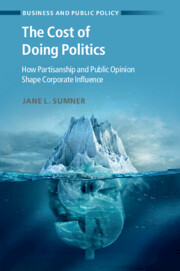Book contents
- Frontmatter
- Dedication
- Contents
- List of Figures
- List of Tables
- Acknowledgements
- 1 Introduction
- 2 Where Does Political Influence Come From?
- 3 How Does Public Opinion Shape Corporate Political Advocacy?
- 4 Why Does the Public Care About Corporate Political Influence?
- 5 Why Do Companies Care About Public Opinion?
- 6 Do Companies Try to Avoid Public Backlash?
- 7 So What and Now What? Summaries and Concluding Thoughts
- Appendix A: Interview Methods
- Appendix B: Chapter 4 Study Methodology and Full Results
- Appendix C: Chapter 5 Robustness Checks
- Appendix D: Chapter 6 Robustness Checks
- References
- Index
- Series page
5 - Why Do Companies Care About Public Opinion?
Published online by Cambridge University Press: 21 April 2022
- Frontmatter
- Dedication
- Contents
- List of Figures
- List of Tables
- Acknowledgements
- 1 Introduction
- 2 Where Does Political Influence Come From?
- 3 How Does Public Opinion Shape Corporate Political Advocacy?
- 4 Why Does the Public Care About Corporate Political Influence?
- 5 Why Do Companies Care About Public Opinion?
- 6 Do Companies Try to Avoid Public Backlash?
- 7 So What and Now What? Summaries and Concluding Thoughts
- Appendix A: Interview Methods
- Appendix B: Chapter 4 Study Methodology and Full Results
- Appendix C: Chapter 5 Robustness Checks
- Appendix D: Chapter 6 Robustness Checks
- References
- Index
- Series page
Summary
This chapter asks whether companies are aware that consumers might support boycott in response to their political activities. I argue that larger companies, companies led by women, and companies with valuable brands are most likely to be vulnerable to backlash. Evidence for this chapter comes from two sources: corporate reports and interviews. Specifically, I use 10-Ks, reports that publicly traded companies file with the Securities and Exchange Commission (SEC) and which are intended to provide stockholders and potential investors with relevant information about the company. Although women CEOs are rare, I find evidence that companies led by women are more likely to cite concerns about the kinds of issues that a public backlash can cause, as are larger companies. Further, I find evidence that suggests that companies are particularly worried about this with reference to brand and reputation damage rather than revenue. I supplement this with evidence from interviews with people with first-hand experience of corporate decision-making and find that companies are quite concerned about the risk of boycott and understand the threat inherent in their political influence-seeking.
Keywords
- Type
- Chapter
- Information
- The Cost of Doing PoliticsHow Partisanship and Public Opinion Shape Corporate Influence, pp. 130 - 161Publisher: Cambridge University PressPrint publication year: 2022

